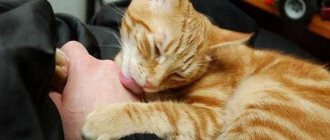Why do cats kill kittens?
The origins of such a cruel attitude towards furry babies by human standards can be seen by studying the habits of wild cats in their natural environment. For example, in lions, all females become pregnant exclusively from the “king of the pride,” and when, in the process of intraspecific struggle for territory, power goes to another male, he invariably kills all the suckling young left by the previous leader. This helps to stop lactation in lionesses and stimulates the beginning of a new sexual cycle, during which mating occurs with a new “king”. Thus, the offspring of the strongest male survives, which ensures the evolutionary viability of the species as a whole.
Domestic cats are guided by the same thing, despite their long-standing tameness, proximity to human habitation and abundance of food. But why do cats kill kittens from a rival male? How do they distinguish between their own and other people's cubs?
It turns out that animal senses are capable of establishing the fact of paternity no worse than a modern DNA test. And the whole point is that the mother cat constantly rubs her muzzle against the bodies of her kittens, spreading an individual scent mark on them. Murks have special scent glands in the corners of their eyes, on their chins and behind their ears. By rubbing themselves against certain objects and the human owner, cats mark them, denoting private territorial possessions. By sniffing the “messages” left behind, the tailed relatives recognize the socio-physiological status of the individual, instantly identifying the stranger.
Accordingly, the smell of the facial glands left by the mother cat on the kittens becomes a signal “yours!” for male cats who mated with her. Many cats, having recognized children, remain indifferent to them, but some become caring fathers, protecting their family from enemies and regularly bringing food.
In addition, wise nature countered the predatory instinct of murder with an equally powerful maternal instinct. Considering the large number of cats in the private sector, pregnant females try to make their lair in the most secluded place and carefully hide newborn kittens. They try to keep the nest clean, and when caring for the babies, they carefully lick them, neutralizing all odors. Nursing mothers minimize their time outside the den, rushing as fast as they can to their babies and, on occasion, staunchly protecting their offspring.
How does a cat behave if the kittens die?
If a tragedy does happen and the kittens die due to the fault of a rival cat, then in the future the cat will behave as the procreation instinct tells it to. For several days she may worry, look for and call her babies, running near the den, and having found corpses, she will try to revive them by licking them and nudging them with her muzzle. And all this looks very sad, given the humanization of animals by the owners.
With increased lactation, psychological discomfort can be aggravated by physical suffering due to overcrowded mammary glands. But the milk soon “burns out”, and the hormonal status triggers the beginning of a new estrus in the body, during which the cat is again ready to mate with any suitable partner.
In some cases, the mother herself becomes the culprit in the death of kittens. Such cases occur due to:
- non-viability, deformity, disease or poor viability of newborns. This is a kind of “sweeping” dictated by natural selection;
- a sharp lack of food or certain nutrients (for example, protein or calcium) for a pregnant cat. In this case, the animal has to choose between its life and the life of its offspring;
- severe stress and psychological trauma. Maternal instinct can fail, turning into postpartum cannibalism, and if such cases are repeated, then it is better to sterilize such a cat.
Source
The cat ate newborn kittens: reasons
In the animal world, an unpleasant situation occurs, in human opinion, when a cat eats newborn kittens. Sometimes this happens immediately after birth, as soon as the offspring are born, and sometimes the cat does it a little later. Perhaps this fate befell only one. And perhaps everyone... Why do cats eat their kittens? Is this an accident or a pattern? There are several answers to the question.
Why do cats eat their kittens?
So, we have sorted out the question of whether cats eat their kittens. Yes, this happens. Now let's figure out whether the fact that a cat ate a kitten is a sign of her mental or physical illness.
First birth
For a first-time cat, the process of giving birth and the appearance of kittens is very stressful. Primiparous cats may not leave their nest for days due to confusion and anxiety and may eat their kittens due to extreme hunger or thirst. Therefore, during childbirth, the owner must be present nearby and calm the pet.
Preventive measures
Cannibalism is not considered a physical disease. Therefore, treatment with medications will not give results. If the owner notices that a pregnant cat has an unstable mental state, manifested by excessive activity, fussiness or irritability, he is recommended to increase monitoring of the animal.
It is important to pay more attention to her and show her love more often. A few weeks before the start of lambing, she is provided with a secluded place where she and her brood will feel calm
This could be a special cat house, a box or a wooden box with soft bedding, an entrance hole and a window for observing the birth in order to provide timely assistance if needed.
Can a cat eat kittens? Why do cats eat kittens?
As you already understand, the situation when a cat eats kittens is rare. Can adult male cats kill a kitten because it is alien, sick, or for some other reason? And if so, why do cats eat kittens?
Practice shows that cats rarely kill kittens and mostly through negligence (crushed, strangled, etc.). Therefore, you don’t need to worry too much about this if you have a mother with a litter and an adult cat in your house. There is no need to worry especially if the two of them live in the house and there are no other males.
However, some males, like females, inherit cannibalism. Can a cat kill a kitten because it is a cannibal? Definitely yes. Can a cat bite a kitten for this reason? Yes. If a cat ate kittens, does that mean he is a cannibal? Most likely, yes too.
But the claim that adult cats can kill a kitten simply because they do not like them, consider them future competitors, or are trying to kill kittens from competing cats is largely a myth. However, tragic situations do happen.
It’s a completely different story if someone else’s cat kills a kitten. There may indeed be intent here. But it does not consist in a sense of competition, as happens, for example, with lions. Most likely, if a cat killed kittens from another father, in fact, this has nothing to do with their father, but with their mother. Thus, the cat, having looked for a female for mating, provokes her to start a new heat as soon as possible, when she can be covered. He knows that while she has small children, she most likely will not flow or show interest in him. But if the cat killed the kitten, he has a chance.
Reasons why daddy cat destroys offspring
Cannibalism is inherent not only to domestic cats, but also to cats. As a rule, the female hides her nest from outside animals. But often a cat finds it and destroys the offspring. At the same time, males kill not only strangers, but also their own cubs. One of the likely reasons why cats eat kittens is to stimulate the female to come into heat. If a cat that has given birth feeds its offspring, it will go into heat after 3 to 4 months. If the cubs die, estrus occurs almost immediately after the kittens die. This pushes males to destroy their offspring and thereby stimulate the female to go into heat.
Another reason why cats kill kittens is competition, the struggle for existence. Adult males perceive small kittens as future competitors for food resources, territory, and females. That is why they can destroy both other people's cubs and their own. Also for this reason, at the level of natural instincts, the mother cat tries to place the future nest in a secluded place, inaccessible to other animals.
A cat (cat) eats kittens - what to do?
Now you know the answer to the question, do cats eat kittens - their own and others'. If such a situation occurred by chance or because the kitten had a pathology, then this is absolutely normal and nothing needs to be done. But if this is not the first time a cat has done this and there are no apparent reasons, then it is sterilized and is no longer used to produce offspring. This indicates a genetic tendency towards cannibalism, which is inherited.
It is also better to castrate kittens from such a cat and not use them when producing offspring, because with a high degree of probability they can also carry the gene for cannibalism.
Source
Prevention measures
Experienced breeders, when detecting such inappropriate behavior in a cat, remove it from further breeding, since cannibalism is inherited. The many reasons why a cat strangles her kittens make them difficult to identify. In this regard, the following preventive measures should be followed:
- Balanced and nutritious nutrition for a pregnant female with the inclusion of vitamin and mineral supplements in food. A veterinarian will help you get recommendations on creating the optimal diet for pregnancy and after birth. Monitoring the level of calcium in the blood to prevent postpartum eclampsia should be done through clinical analysis, since both high and low levels of the mineral in the body are dangerous;
- Preparing the nest in a secluded, quiet and safe place, inaccessible to outside animals. A thick cardboard box or exhibition box is suitable for these purposes. The nest should be placed in a dark place. It should be dry and warm. This organization corresponds as closely as possible to the natural conditions inherent in the cat at the genetic level.
The cat reacts aggressively to the kitten
Well, it certainly won’t kill to kill, they have a taboo on it. But, periodically it can even strangle. Our 6-year-old cat did this when a 2-month-old female kitten was brought into the house. He will squeeze her somewhere in a corner and squeeze her there, roll around, strangle her, she screams like a fool. I must say that sometimes he still does this, although very rarely. The cat is now, thank God, 9 years old, and the cat is 15. The cat is almost twice the size of the cat, but the cat still builds it. Now, though they are almost inseparable, they sleep together.
Cats are accustomed to each other within 1-2 weeks, under your supervision. Usually this time is enough for the cats to get used to it. But whether they will be friends is a big question. It's a lottery. In the neighboring branches there is a lot of information on training cats to friend each other, read it.
I have an 11-month-old cat, neutered; we were recently given a kitten, a 1.5-month-old girl. The cat reacts aggressively to her, rushes and bites. It seems that if we don’t pull him away, he might strangle her. His kitten is not afraid to climb up to play with him. You can see from the cat that he was offended, stopped approaching the owners, all his attention was on the kitten. Can a cat harm a kitten? and how to change this behavior?
Judging by what you describe, the kitten should live under the sofa, never leaving. If he boldly climbs up to the cat, it means he doesn’t see the danger. If he doesn’t see it, it means there’s no danger. Castrate the cat, otherwise in 4 months he will climb on the cat (unless you specifically achieve this))) The probability of friendship is closer to 100%
Source
Hunting training
For many, the behavior of a cat when she teaches kids to hunt comes as a surprise. At the same time, people do not always understand that what is happening is just lessons that do not pose any danger. As a rule, during such activities, the mother cat can catch the kitten with her front paws, hold it quite tightly, and begin to beat it with her hind paws. At the same time, the cat takes turns biting and licking the baby, in addition, it can also purr, letting the kitten know that it is doing everything right. From the outside, this behavior may seem very strange. In fact, the mother cat is simply showing her babies how to properly grab the victim and then suppress it. These skills can also be useful for young cats in order to defend their territory in the future. Over time, you will notice that the kittens begin to practice the learned techniques on each other.
Later, when the kittens become more mature and are already moving around the entire apartment, it will be possible to observe new lessons that will already include stalking skills and hunting jumps. Here mom will show by her own example how to carefully track down a victim, sneak around, and then attack. It is possible that household members will become victims. Well, then, the kittens will also practice the acquired knowledge, both on each other and on their mother.
why do cats and tomcats need whiskers?











